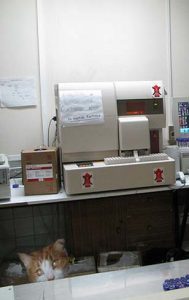
Why Is My Dog Or Cat’s Blood Bicarbonate Level Low Or High?
Bicarbonate = Total CO2; TCO2; Carbon Dioxide Content; CO2 Content; Bicarb= HCO3
Ron Hines DVM PhD
 See What Normal Blood & Urine Values Are
See What Normal Blood & Urine Values Are
 Causes Of Most Abnormal Blood & Urine Tests
Causes Of Most Abnormal Blood & Urine Tests
 Bicarbonate Issues Also Read Causes Of High Anion Gap
Bicarbonate Issues Also Read Causes Of High Anion Gap
Bicarbonate in the kitchen is baking soda. But bicarbonate in the body is the most important buffer in your dog or cat’s blood and other tissue fluids. Buffers act like car shock absorbers and torsion bars to lessen large swings in body acidity produced by normal, and abnormal chemical processes going on in your pet’s body (its metabolism). Measuring your pet’s blood bicarbonate level provides your veterinarian with similar information, as does the measurement of your pet’s Anion Gap or Blood pH.
Health Problems That Can Cause Your Dog Or Cat’s Bicarbonate Level To Be Low:
Diseases that can cause your pet’s blood to be too acidic (=low pH, low bicarb) include kidney disease, chronic diarrhea, diabetes in cats or in dogs, and Addison’s disease and antifreeze poisoning. Any situation that causes metabolic acidosis will also cause low bicarb readings.
In humans, lung disease, aspirin overdoses, ingestion of methyl or ethyl alcohol or metformin, over consumption of iron supplements, exposure to exhaust fumes, consumption of toxic plants such as oleander, henna, castor beans, collinus. have all caused low blood bicarbonate. How cats and dogs might be affected by these agents is unknown.
When Might My Cat or Dog’s Bicarbonate Level Be High?
Anything that causes metabolic alkalosis elevates blood bicarbonate and blood pH. That includes overconsumption of antacids that contain sodium bicarbonate (e.g. Alka-Seltzer™), prolonged vomiting, diuretics, corticosteroids, dehydration or Cushing’s disease. The signs of metabolic alkalosis include muscle twitching, tremors, seizures and heart irregularities.
Complementary tests:
CBC/ WBC and blood chemistry panel, anion gap, blood Sodium, blood Potassium & blood Chloride, levels. Blood gases analysis, kidney function tests: BUN & creatinine, as well as the many tests suggested in diagnosing the conditions I mentioned in discussing blood pH, and the anion gap.
DxMe
You are on the Vetspace animal health website
Visiting the products that you see displayed on this website help pay the cost of keeping these articles on the Internet.

